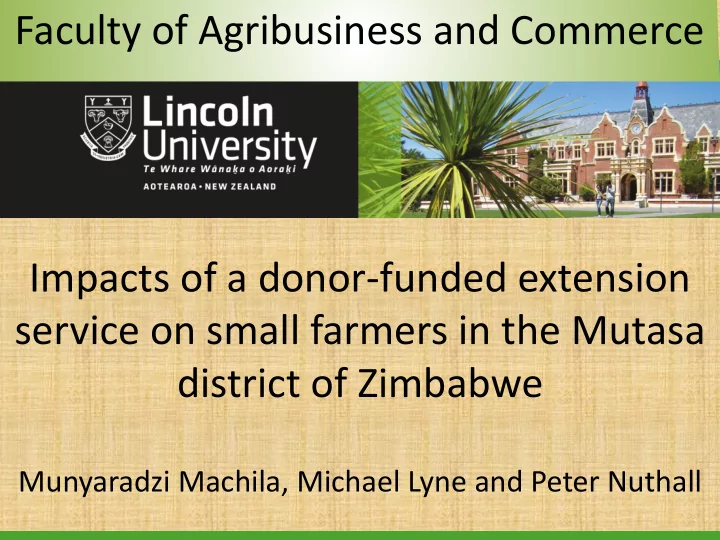

Faculty of Agribusiness and Commerce Impacts of a donor-funded extension service on small farmers in the Mutasa district of Zimbabwe Munyaradzi Machila, Michael Lyne and Peter Nuthall
Introduction • Governments often fund agricultural extension services that have public good attributes. • There is a trend to outsource the delivery of these services to NGOs, firms & farmer organisations in order to improve cost efficiency and effectiveness. • Several countries in sub-Saharan Africa are experimenting with outsourcing models, including Zimbabwe. • However, little is known about the impact or value-added by outsourced extension services.
Lincoln University | www.lincoln.ac.nz
This paper evaluates an outsourced extension project funded by USAID in the Mutasa district of Manicaland province in Zimbabwe. The extension services are delivered by Favco, a local company that processes fruit and vegetables. These services include: Training and advisory services on farming practices (especially bananas and subsistence crops); Provision of loans for seasonal farm inputs; Help accessing markets; Introducing new technologies e.g. tissue culture seedlings. Lincoln University | www.lincoln.ac.nz
Research objective • To evaluate the donor-funded agricultural extension services delivered by Favco in the Mutasa district of Zimbabwe. Research question (for this paper) • What is the impact of Favco’s extension services on small farmers in the study area?
Methods Two sample surveys were conducted between April and June 2014 The first was a representative sample of all households in the study area (n h =152) The second sample was a census survey of all new clients serviced by Favco in the study site (N wc =32) The samples yielded 184 respondents 94 respondents had been serviced by Favco, n c =94 and, 90 respondents were non clients, n nc =90)
Characteristics of a representative household (n h =152) Variable Mean Size of household (persons) 5 Age of the de facto head of the household (years) 47 Formal schooling of the de facto head (years) 8 Farming experience acquired by de facto head (years) 13 Revenue from farming operations (US$) 864 Revenue from bananas only (US$) 645 Expenditure on farm inputs and services (US$) 286 Value of livestock (US$) 422 Value of farm improvements (US$) 254 Computed from the data gathered for the period 2013/2014 season Lincoln University | www.lincoln.ac.nz
Evaluating the impact of extension services Important to compare similar households within the client and non client groups Propensity Score Matching was used to identify a subset of client and non-client households with similar observed family and farm characteristics. 76 pairs of clients and non-clients were matched for comparison
Table 1 Comparison of mean outcomes (n=152) Treatment Control t- Outcomes (client households) (non-client households) statistic (n=76) (n=76) Revenue from all crops (US$) 1154.95 503.52 Net revenue all crops (US$) 762.63 326.12 Revenue from bananas (US$) 1031.61 323.24 Cost of inputs & services (US$) 383.25 178.66 Revenue from livestock (US$) 25.92 19.54 Liquidity (US$) 1572.44 841.87 Lincoln University | www.lincoln.ac.nz
Lincoln University | www.lincoln.ac.nz
To what extent did the extension services contributed to these differences? We estimated a general treatment model using 2SLS with instrumental variables to control for selection bias. Results The model estimated that extension services: Added US$ 321/adult equivalent to revenue from bananas Added US$ 210/adult equivalent to net crop revenue Added US$ 75/adult equivalent to inputs and services purchased Added US$ 293/adult equivalent to household liquidity Lincoln University | www.lincoln.ac.nz
Lincoln University | www.lincoln.ac.nz
In addition, the vast majority of clients reported improvements in: Household food security Quality of family’s diet Family’s health Access to support networks Household savings Child education Lincoln University | www.lincoln.ac.nz
Conclusions Favco’s extension services had a significant positive impact on household farm earnings The technique revealed that household land and labour endowments, investment in irrigation and fencing, and possession of a mobile phone were important determinants of participation Improvements in rural health, telecommunications, smallholder access to capital and the land rental market are expected to promote the uptake of extension services and their economic benefits However, it is not yet clear that the benefits of Favco’s extension services outweigh the costs of delivery Lincoln University | www.lincoln.ac.nz
The authors gratefully acknowledges: 1. Financial support from New Zealand Agency for International Development Programme, Ministry of Foreign Affairs and Trade (MFAT); and 2. Fintrac Inc. and its partner, Favco for allowing the first author to carry out field work in their project target area, Honde Valley. Opinions expressed in this paper are those of the authors and do not necessarily reflect the views of the sponsor or organisations mentioned . Lincoln University | www.lincoln.ac.nz
Thank you Questions and Comments Lincoln University | www.lincoln.ac.nz
Recommend
More recommend